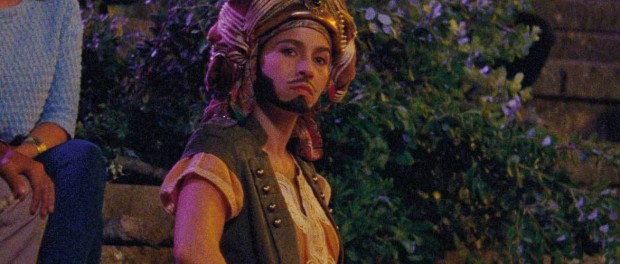Review of Arabian Nights: Part 2 – The Desolate One
Miguel Gomes brings us the second part of his Arabian Nights story: this one is called The Desolate One. The film makes no reference to its first part and is pretty much a standalone, cinematically and in narrative. The only thing that makes reference to the first part, for those who have watched it, is the continued malaise of the Portuguese populace and the economic burdens they continue to face.
Gomes continues to shoulder the responsibility of the tale to its narrator (Arabian Queen) Scheherazade. Through the two hour long voiceover of Scheherazade, her voice becomes this monotonic thread as it conveys the tragedy of a people with little emotion. It’s as if the emotion has reached a state of complete numbness.
The episodic device continues and first we encounter “The chronicles of the escape of Simao.” While most of the village knows that Simao is absconding and hiding from the police, there seems to be an unsaid recognition of his taking on the authorities and standing up to them. The fact that he swindled money from them makes him more of a hero than a criminal. His murder of his wife is also overlooked, as he did the unthinkable and continues to fight the powers that be. It’s enough that when he does get caught, he is hailed as a hero by the village folk who stand by as he is taken away.

Arabian Nights Part 2: The Desolate One. Credit- Kino Lorber.
The second story is “The tears of the Judge.” Absurdity defines this second story: a tenant woman steals her (incessantly rude) landlord’s furniture to pay her daughter-in-law to stay with her son, who treats his wife only as a sex object and nothing else. The daughter-in-law follows by taking to the stage and exposing the absurd behaviours of the landlord. She has also learnt to forgive her husband and forego her compensation. She wishes to re-join him and be treated as a sex-object.
The landlord, for his part, has his own reasons for his absurdities… and the cycle goes along through different people in the assembled audience until, in the end, the judge finds herself surrounded by depraved stories. The story ends with the judge reduced to tears. There are themes of exploitation, suppression by the powerful, succumbing to exploitation and then being willingly oblivious to it that jump out constantly.
“The Owners of Dixie” is the third and final episode of this part. Dixie is a little dog and becomes the metaphor of continued hardship and suffering of the people. Dixie moves from one household to the other in a building and with him the all-pervasive challenges across all aspects of life. While ‘austerity’ is not a word often used, it is the obvious target of the poverty-stricken people.
Gomes employs such skill and ingenuity in alluding to the obvious in so many ways that it’s very easy to be taken in by yet another disjuncted storyline. Coherence is not what I was seeking and this second instalment has inherent smarts and is more melodic in its tragedy. I’m looking forward to the last piece of Gomes’s puzzle and how he will bring it to some sort of finality.
Arabian Nights Volume 2: The Desolate One screened at Cinema du Parc.






